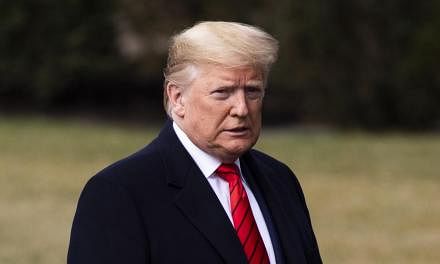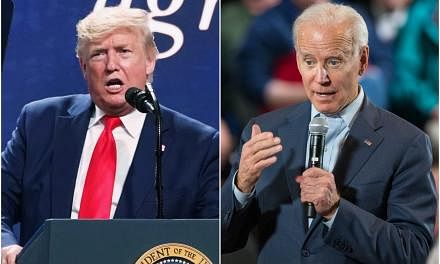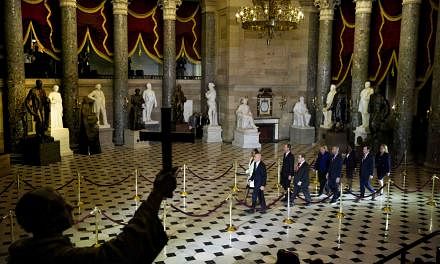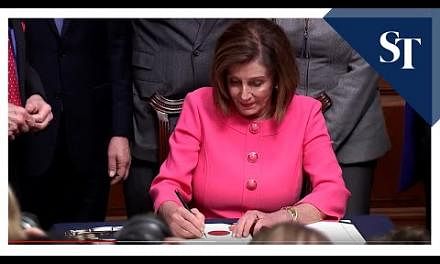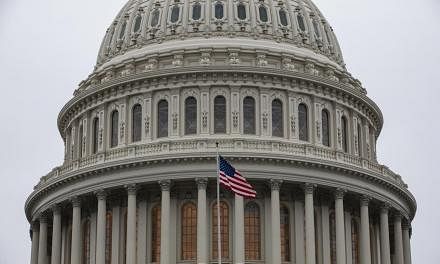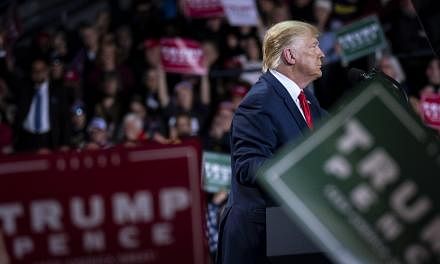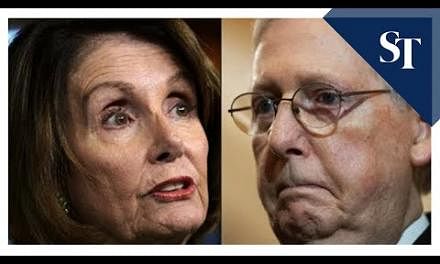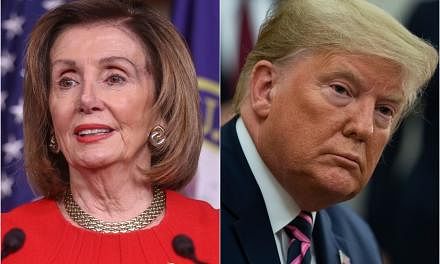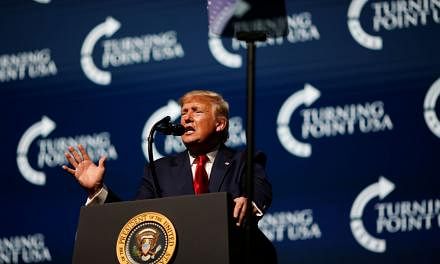WASHINGTON (BLOOMBERG) - The United States Senate voted against seeking new evidence in President Donald Trump's impeachment trial, sending the months-long inquiry into its final stages, with a vote set for next Wednesday (Feb 5) to acquit him.
Friday's 51-49 vote blocking witnesses, one of the most consequential of the trial, fell mostly along party lines.
Two Republicans - Maine Senator Susan Collins and Utah Senator Mitt Romney - joined all 47 Senate Democrats and independents in voting for additional testimony and documents.
Two Republicans who had considered voting for witnesses - Tennessee's Lamar Alexander and Alaska's Lisa Murkowski - voted against the motion.
Democratic leader Chuck Schumer said that with the decision not to seek more evidence, the Senate "turned away from truth and went along with a sham trial".
"America will remember this day, unfortunately, when the Senate did not live up to its responsibilities," Mr Schumer said. "If the President is acquitted with no witnesses and no documents, then the acquittal has no value."
The final vote on Mr Trump's conviction or acquittal will be held next Wednesday, according to a Senate resolution adopted on Friday night. There won't be a Saturday session, and the Senate will reconvene next Monday at 11am for closing arguments from House prosecutors and Mr Trump's defence.
Senate Majority Leader Mitch McConnell called Mr Trump on Friday to get his approval for this timeline, and the President agreed, according to a person familiar with their conversation.
The new schedule gives senators time before next Wednesday's final vote to publicly explain on the Senate floor how they decided whether Mr Trump deserved to be removed from office on the House's charges that he abused the power of his office and obstructed Congress.
The Senate also rejected all four amendments Democrats offered on Friday in a last-ditch effort to subpoena additional witnesses and documents.
Before the amendment votes, Mr Schumer sought to clear up one uncertainty that hung over the trial this week: Whether Chief Justice John Roberts, the trial's presiding officer, would cast a vote to break a tie.
Mr Roberts said he didn't consider the historical precedent to be strong enough for him to weigh in on decisions that should be made by elected officials.
Republicans have argued that it wasn't necessary to draw out the trial since it would take 67 votes to convict Mr Trump in the Republican-led chamber.
Even though Democrats on Friday said they were resigned to Mr Trump's eventual acquittal, they said senators should be able to explain how they planned to vote.
"We feel strongly that this needs to be a fair trial and that each member gets an opportunity to say how they feel and say how they came to their decision," said Michigan Senator Debbie Stabenow, a member of Democratic leadership.
The extended timeline adds to an already complicated schedule for next week.
On Monday, Iowa holds its caucuses, where four Senate Democrats are seeking the party's presidential nomination. The next day, Mr Trump is scheduled to deliver his State of the Union address to a joint meeting of Congress in the very chamber where the House impeached him six weeks ago.
"The President is gratified that finally, at long last, after multiple delays, the Senate will set a schedule for his acquittal as quickly as possible," Mr Eric Ueland, Mr Trump's director of legislative affairs, said on Friday.
"We do not believe that that schedule interferes with his ability to deliver a strong and confident State of the Union message next week in the House of Representatives to the country."
The outcome of the vote on witnesses was sealed when Ms Murkowski announced on Friday that she would vote against bringing in new evidence. She was one of the last Republicans who remained publicly uncommitted.
"I have come to the conclusion that there will be no fair trial in the Senate," she said. "I don't believe the continuation of this process will change anything. It is sad for me to admit that, as an institution, the Congress has failed."
The vote on witnesses came on the same day the New York Times reported that former Trump national security adviser John Bolton wrote in an unpublished manuscript that the President directed his aides in May to help pressure Ukrainian officials to dig up damaging information on a Democratic rival.
That was two months before Mr Trump asked Ukraine's president in a phone call to investigate former vice-president Joe Biden and his son, who had served on the board of a Ukrainian energy company. And one of the officials present during the May discussion, according to Mr Bolton, was White House Counsel Pat Cipollone, who is leading the defence team.
Mr Bolton was one of the main witnesses Democrats wanted to call in the trial, and he had said he would be willing to testify under subpoena.
An earlier revelation from his manuscript - that Mr Trump directly linked the release of military aid for Ukraine to help with digging up dirt on Democrats - had GOP leaders scrambling to head off the chance that Democrats would get four Republican senators to agree with them.
Final Appeal Representative Adam Schiff, who is leading the House impeachment managers, cited the Times report in his final appeal to Republicans to call new witnesses in the trial. He said the presence of Mr Cipollone in the meeting made him a fact witnesses to the events at the heart of the impeachment charges.
"There is a new fact which indicates that Mr Cipollone was among those who were in the loop, yet another reason why we ought to hear from witnesses," Mr Schiff said on Friday.
The vote may have political ramifications for senators up for re-election this year. Democrats accused Republicans of attempting to "cover up" Mr Trump's alleged crimes, and they have vowed to remind voters in November of how their senators voted on the matter.
A Quinnipiac University poll published this week found that 75 per cent of respondents favoured witnesses in the Senate trial, including 49 per cent of Republicans.
Four Republican senators facing tough re-election campaigns this year - Cory Gardner of Colorado, Martha McSally of Arizona, Joni Ernst of Iowa, and Thom Tillis of North Carolina - all voted against calling new witnesses.

